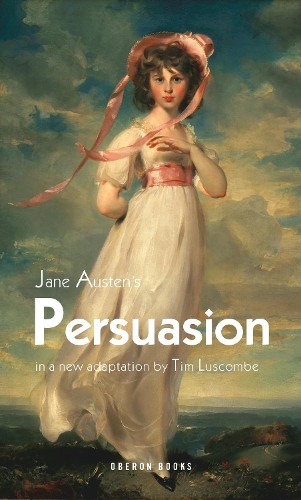
Persuasion
(Paperback)
Publishing Details
Persuasion
By (Author) Tim Luscombe
Original author Jane Austen
Bloomsbury Publishing PLC
Oberon Books Ltd
19th October 2011
United Kingdom
Classifications
General
Non Fiction
822.92
Physical Properties
Paperback
96
Width 130mm, Height 210mm
142g
Description
Anne Elliot fell deeply in love with a handsome young naval officer, Frederick Wentworth, at the age of nineteen. But because he had neither fortune nor rank to recommend him, Annes mentor and friend, Lady Russell, persuaded her to break off the engagement. Eight years later, Anne has lived to regret her decision. She never stopped loving Frederick and when he returns from sea a Captain, she can only watch as every eligible young woman falls at his feet. Can the pair rekindle a love that was lost but not forgotten This new adaptation was commissioned and first produced by Salisbury Playhouse in 2011.
Reviews
It is very Austen: handsome, literate, eloquent, repressed The Times
It is very Austen: handsome, literate, eloquent, repressed The Times
Author Bio
Tim Luscombe is a writer and theatre director. As a playwright, his plays include EuroVision (1994), The One You Love (1996), The Schuman Plan (2006), Hungry Ghosts (2010) and Pig (2013). He has written several stage adaptations from 19th Century novels including Northanger Abbey (2005), Persuasion (2011), Mansfield Park (2012), Silas Marner (2014), Emma (2017) and Turn of the Screw (2018). In 2018, his auto-fictional book Learning German (badly) was published. As a director, his work includes over 50 theatrical productions in the West End, on- and off-Broadway, in Japan, Europe and all over the UK. In 1992 he co-founded the London Gay Theatre Company and was its artistic director till 1996. He lives in Berlin and is currently writing a novel. Jane Austen (1775-1817) was an English novelist whose works are among the most popular novels ever written. Her keen eye for social tension, and ear for taut, witty dialogue have delighted readers for centuries, while her novels have maintained historical importance through their analysis of the dependence of women on marriage to gain social standing and security. She has been widely adapted for both stage and screen, and continues to be among the most widely-read of late-18th-/early 19th-century writers.
